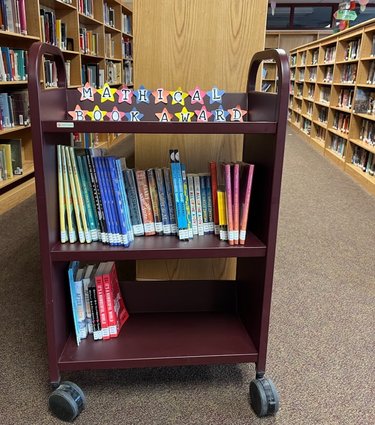BKW uses library award to purchase nearly 50 math-focused books
HILLTOWNS — After seeing the Mathical Book Prize show up on grant lists year after year and deciding not to bother applying because of its highly competitive nature — only 25 schools across the country receive the prize annually — Berne-Knox-Westerlo librarian Beth Davis took a shot and, to her surprise, made it in.
With the $700 award, Davis was able to purchase 49 new books, all of which focus on math’s place in the wider world, using storytelling to stimulate student’s imaginations for a subject that they may have dismissed early on in their schooling.
The books come from a list put together by the Mathematical Sciences Research Institute, and Davis said that, as she was looking through the list to plan her order, she was “amazed” at the number of fiction books aimed at older readers. When she started her career 26 years ago, math and reading diverged from each other at the upper levels of schooling.
For instance, one book now sitting on BKW’s library shelf called “Nearly Gone” is about a 16-year-old girl who, to thwart a serial killer, has to use the sort of open-ended, big-picture reasoning that’s crucial in math.
That’s a far cry from the nested problem-set about Babe Ruth’s batting performance during the 1931 season that you might see in the margins of a traditional stats textbook.
“In elementary [school], you have a lot of counting books, numbers books …,” Davis said. “But I’m seeing more and more, as time goes on, books that somehow incorporate students that love math.”
Math, of course, has long been a love-it-or-hate-it subject, probably because it’s very different from other subjects like reading and history, where proving knowledge is theoretically as simple as having it. With math, it’s about putting all that knowledge toward something, which taxes one type of thinking, and then showing how you did it, which taxes another.
As Gallup reported in 2003, the then-Director of Institute of Educational Sciences Grover Whitehurst said that that ability-splitting — and the different teaching models that compete to focus on each one — might be partly to blame for Americans’ general lack of proficiency in the subject.
The disdain that some people have for math has risen to the point that some educators recognize it as a potential anxiety response, which is not necessarily tied to their innate ability, even affecting some teachers, according to Education Week.
Add in some toxic notions about gender performance and social status, as well as how easily it can be divorced from what we think of as everyday life, and math becomes an almost occult-like area of practice, hence the Mathematical Sciences Research Institute’s attempt to funnel money into a new way of bringing math concepts to students at their level, instead of waiting for it to happen the other way around.
For her part, Davis said that she designed a lesson plan as part of the grant application that will have the secondary and elementary students in the school work together to build their math skills using some of the picture books she bought for younger readers.
“The secondary kids will take the books, create lessons using the books, and then go into elementary classes to teach,” she said.



